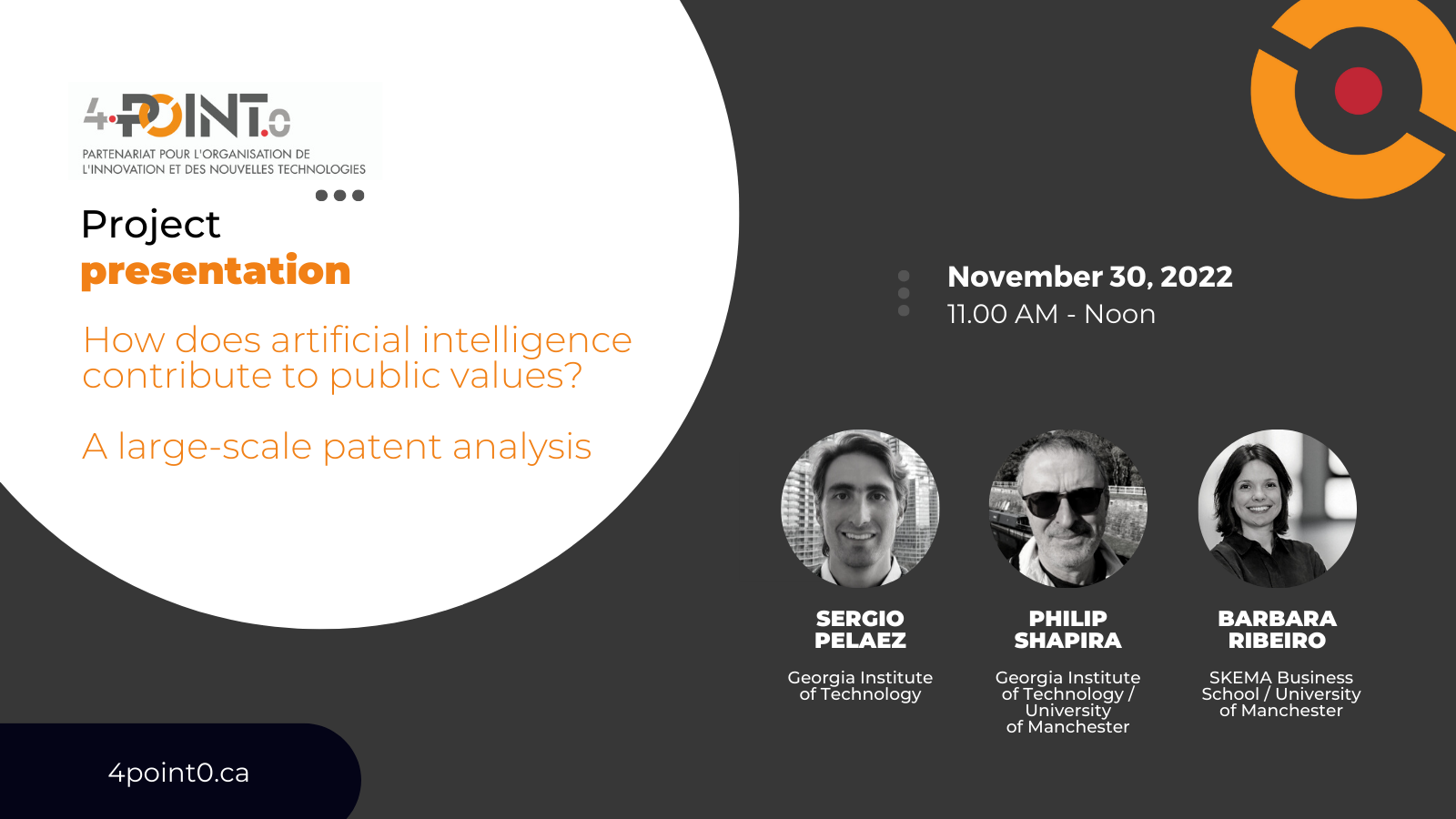How does artificial intelligence contribute to public values? A large-scale patent analysis
2022-11-30 • 11 am Noon

Projet 4POINT0 – Présentation et rencontre d’échange
Venez à la rencontre des équipes de recherche 4POINT0!
Les chercheuses et chercheurs, étudiantes et étudiants ainsi que leurs partenaires industriels vous donnent rendez-vous pour découvrir et discuter de leurs projets 4POINT0.
Joignez-vous à nous le 30 novembre 2022 pour découvrir les résultats de nos recherches à 4POINT0. Présenté par Sergio Pelaez (Georgia Institute of Technology), superviseur Philip Shapira (Georgia Institute of Technology / University of Manchester) et partenaire Barbara Ribeiro (SKEMA Business School / University of Manchester).
Résumé
Artificial Intelligence (AI) applications are now pervasive. AI brings bother potential social benefits and potential harms, making it a suitable field for studying public values in emerging technologies. Patent texts are a valuable source to identify public value expressions of new AI inventions. After conceptualizing and operationalizing an ontology of public values, this research uses a BERT language model to classify US AI patent documents according to whether they express public values. A topic model identifies the main public value themes in AI patents (e.g., healthcare, privacy, discrimination, environment, etc.). We seek to explore the motivation of inventors and assignees to include public values in their patents by estimating associations between expressions of public values and patent features (e.g., patentee characteristics, public funding) and external influences (e.g., regulatory changes and the rise of societal concerns).
Rediffusion
Aperçu du projet en 3 minutes
Présenté par :

Sergio Pelaez
Georgia Institute of Technology, USA
LinkedIn
Sergio is a doctoral student in Public Policy at Georgia Tech and a Graduate Research Assistant at STIP. His research examines how policy, incentives, and social networks shape researchers’ scientific and technological outcomes and the societal impacts of such activities. He is also interested in unraveling the determinants of business innovation and identifying its effects on firms’ performance.
Superviseur

Philip Shapira
Georgia Institute of Technology, USA / University of Manchester, UK
LinkedIn
Philip Shapira is Professor of Innovation Management and Policy with the Manchester Institute for Innovation Research, Alliance Manchester Business School, University of Manchester, and a Professor of Public Policy, Georgia Institute of Technology, Atlanta.
Philip is internationally recognized for research, engagement and policy leadership in science and technology, innovation management, manufacturing strategies, emerging technologies, and responsible innovation.
Professor Shapira is a Fellow of the American Association for the Advancement of Science and a Fellow of the Royal Society of Arts.
Partenaire

Barbara Ribeiro
SKEMA Business School / University of Manchester, UK
LinkedIn
Barbara Ribeiro is Associate Professor at the SKEMA Business School. Université Côte D’Azur, France. Her research interests include science and technology studies, innovation studies, and innovation policy.
Barbara is an Honorary Research Fellow with the Manchester, where she was previously a Presidential Fellow.
Barbara’s research sits at the intersection of science and technology studies and innovation studies. Most of her work has focused on the social and ethical aspects of emerging technologies and responsible innovation. Barbara is currently developing research in the areas of automation, digital technologies and artificial intelligence, looking at their impact on the way we work, the ethics of monitoring practices and people’s relations with data-intensive environment
Membre de l’équipe
Gaurav Verma
Georgia Institute of Technology, USA
LinkedIn
Acknowledgements: This research has received support from the National Science Foundation (Award # 1759960); and 4POINT0 (Mapping Innovation Ecosystems using Web Analytics; and Anticipating Transformative Innovations and their Implications). Any opinions, findings, and conclusions or recommendations expressed in this material are those of the author(s) and do not necessarily reflect the views of the National Science Foundation or 4POINT0.

Ce contenu a été mis à jour le 2022-12-15 à 19 h 26 min.